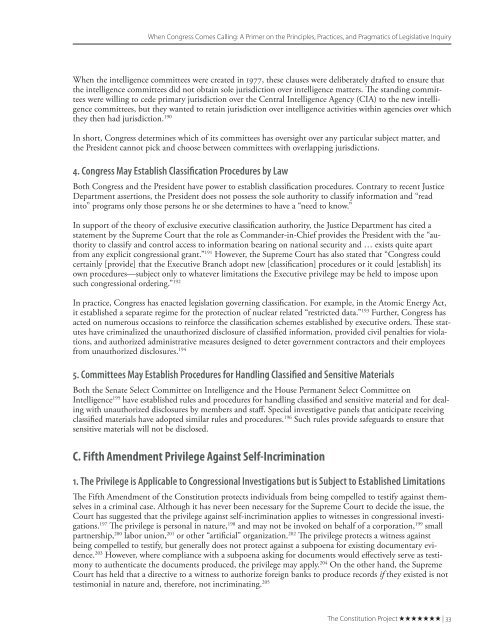When Congress Comes Calling
WhenCongressComesCalling
WhenCongressComesCalling
Create successful ePaper yourself
Turn your PDF publications into a flip-book with our unique Google optimized e-Paper software.
<strong>When</strong> <strong>Congress</strong> <strong>Comes</strong> <strong>Calling</strong>: A Primer on the Principles, Practices, and Pragmatics of Legislative Inquiry<br />
<strong>When</strong> the intelligence committees were created in 1977, these clauses were deliberately drafted to ensure that<br />
the intelligence committees did not obtain sole jurisdiction over intelligence matters. The standing committees<br />
were willing to cede primary jurisdiction over the Central Intelligence Agency (CIA) to the new intelligence<br />
committees, but they wanted to retain jurisdiction over intelligence activities within agencies over which<br />
they then had jurisdiction. 190<br />
In short, <strong>Congress</strong> determines which of its committees has oversight over any particular subject matter, and<br />
the President cannot pick and choose between committees with overlapping jurisdictions.<br />
4. <strong>Congress</strong> May Establish Classification Procedures by Law<br />
Both <strong>Congress</strong> and the President have power to establish classification procedures. Contrary to recent Justice<br />
Department assertions, the President does not possess the sole authority to classify information and “read<br />
into” programs only those persons he or she determines to have a “need to know.”<br />
In support of the theory of exclusive executive classification authority, the Justice Department has cited a<br />
statement by the Supreme Court that the role as Commander-in-Chief provides the President with the “authority<br />
to classify and control access to information bearing on national security and … exists quite apart<br />
from any explicit congressional grant.” 191 However, the Supreme Court has also stated that “<strong>Congress</strong> could<br />
certainly [provide] that the Executive Branch adopt new [classification] procedures or it could [establish] its<br />
own procedures—subject only to whatever limitations the Executive privilege may be held to impose upon<br />
such congressional ordering.” 192<br />
In practice, <strong>Congress</strong> has enacted legislation governing classification. For example, in the Atomic Energy Act,<br />
it established a separate regime for the protection of nuclear related “restricted data.” 193 Further, <strong>Congress</strong> has<br />
acted on numerous occasions to reinforce the classification schemes established by executive orders. These statutes<br />
have criminalized the unauthorized disclosure of classified information, provided civil penalties for violations,<br />
and authorized administrative measures designed to deter government contractors and their employees<br />
from unauthorized disclosures. 194<br />
5. Committees May Establish Procedures for Handling Classified and Sensitive Materials<br />
Both the Senate Select Committee on Intelligence and the House Permanent Select Committee on<br />
Intelligence 195 have established rules and procedures for handling classified and sensitive material and for dealing<br />
with unauthorized disclosures by members and staff. Special investigative panels that anticipate receiving<br />
classified materials have adopted similar rules and procedures. 196 Such rules provide safeguards to ensure that<br />
sensitive materials will not be disclosed.<br />
C. Fifth Amendment Privilege Against Self-Incrimination<br />
1. The Privilege is Applicable to <strong>Congress</strong>ional Investigations but is Subject to Established Limitations<br />
The Fifth Amendment of the Constitution protects individuals from being compelled to testify against themselves<br />
in a criminal case. Although it has never been necessary for the Supreme Court to decide the issue, the<br />
Court has suggested that the privilege against self-incrimination applies to witnesses in congressional investigations.<br />
197 The privilege is personal in nature, 198 and may not be invoked on behalf of a corporation, 199 small<br />
partnership, 200 labor union, 201 or other “artificial” organization. 202 The privilege protects a witness against<br />
being compelled to testify, but generally does not protect against a subpoena for existing documentary evidence.<br />
203 However, where compliance with a subpoena asking for documents would effectively serve as testimony<br />
to authenticate the documents produced, the privilege may apply. 204 On the other hand, the Supreme<br />
Court has held that a directive to a witness to authorize foreign banks to produce records if they existed is not<br />
testimonial in nature and, therefore, not incriminating. 205<br />
The Constitution Project | 33


